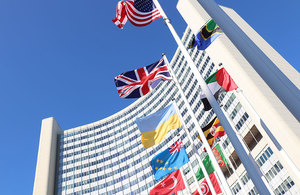Nuclear Technology Review 2023: UK National Statement to the IAEA Board of Governors
Delivered at the International Atomic Energy Agency in Vienna, March 2023

Chair,
The United Kingdom thanks the Director General for his report on the Agency’s activities related to nuclear science, technology and applications and we reiterate our support for the Agency’s role in researching, promoting and sharing the benefits of peaceful nuclear technologies. We recognise the important contribution the Agency makes to Member States’ implementation of the Sustainable Development Goals and wider development needs, as the DG highlights in this report.
We continue to assist the Agency in their crucial efforts to promote peaceful uses. Today I can announce that the UK will provide £1.5million in extra budgetary funding across a number of peaceful uses priorities: to support the group pledge on the modernisation of the IAEA’s laboratories at Seibersdorf, and support to IAEA projects in Isotope Hydrology, Marine Plastics and Gender.
The UK remains committed to delivering energy security and combatting climate change and believes that nuclear energy should play an important role in this. The recently formed Department for Energy Security and Net Zero, our Ministry in London, will provide dedicated leadership on these priorities and will be responsible for driving forward our ambitions, as set out in the British Energy Security Strategy, to boost deployment of civil nuclear up to 24 Gigawatts by 2050.
We believe Advanced Nuclear Technologies, including Small Modular Reactors, will play a part in this global effort. As the report highlights, the UK, along with many other Member States, have made tangible progress in SMR technology development. These technologies will play an important role alongside large-scale nuclear to support a secure, affordable and decarbonised energy system. The UK is working closely with the IAEA and others on the next generation of nuclear technologies, to promote the highest standards of nuclear safety, security and safeguards.
Given there are more than 80 SMR designs in development across the globe, deeper coordination and information sharing between Member States, vendors and regulators is critical. In this spirit, the UK’s Office for Nuclear Regulation has signed a Memorandum of Cooperation with the Canadian Nuclear Safety Commission to leverage shared technical knowledge and seek mutually beneficial convergence in regulatory standards – we stand ready to explore similar engagement with other partners.
We would also like to thank the Director General for his ambition on Small Modular Reactors and his efforts to develop common standards through the Nuclear Harmonisation and Standardisation Initiative (NHSI).
Ahead of the NHSI Stocktake Plenary in June, I would like to outline two further areas where we think the IAEA could make tangible progress. First, regulation must keep pace with nuclear innovation. The UK notes the potential of advanced reactors in decarbonising hard-to-abate sectors. However, it is crucial that we uphold high standards of nuclear safety, security, and safeguards, particularly given these technologies involve novel coolants and fuels. Similarly, we are keen to understand the implications of Floating Nuclear Power Plants, which have raised important questions regarding nuclear regulation, safety and security. We look forward to working closely with the Agency and other Member States on these important issues.
The potential of fusion to transform global energy generation is unparalleled, and we are excited for the global fusion community to come together to drive it forward. The UK Government is determined to make Fusion a reality, that is why our recently established investment delivery body will work with industry to deliver STEP, a prototype fusion power plant in the UK that is capable of putting energy on the grid by 2040.
The United Kingdom is excited to be hosting the 29th IAEA Fusion Energy Conference in October this year. The UK Atomic Energy Authority are delighted to be working in collaboration with the IAEA to welcome over 40 countries, international organisations and research institutes to this important event, discussing the latest developments in fusion technology.
With these comments, my delegation takes note of the report GOV/2023/3.
Thank you.